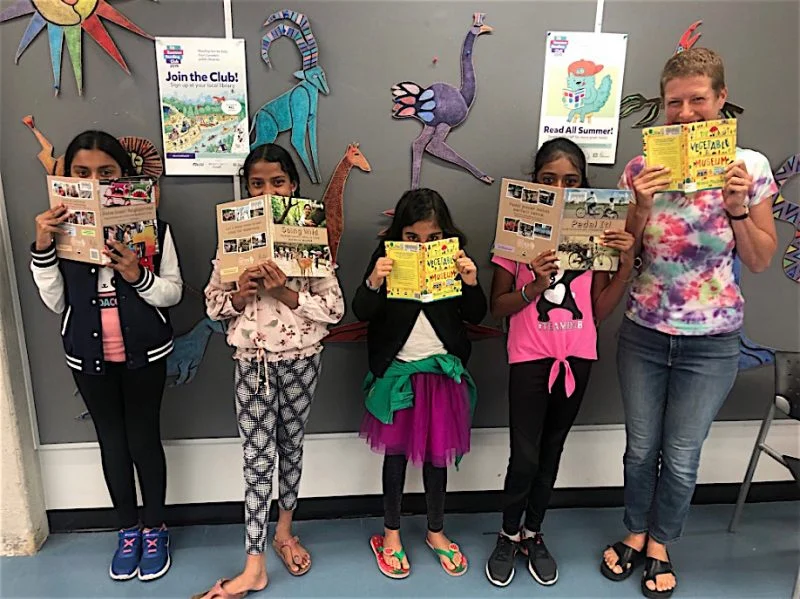#724 Postwar gardening therapy
The Vegetable Museum
by Michelle Mulder
Victoria: Orca Books, 2019
$10.95 / 9781459816794
Reviewed by George M. Johnson
*
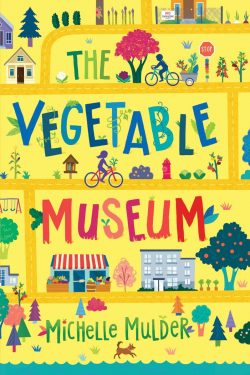 Michelle Mulder cultivates rich soil (sorry I couldn’t resist that) in her middle-grade novel about 13 year-old Chloë Becher, forced to move from Montreal to Victoria with her Dad when her parents separate. Initially she finds the new terrain hostile, missing her comfortable home life and best friend Sofia, but she strikes up a friendship with Uli, the grandfather she had never known, who now lives across the street from her. Although he has suffered a stroke and seems startling at first, she finds him intriguing, particularly his passion for heirloom vegetables, first seen by her as “weird ones that no one else bothers with” but eventually felt by her as worth taking risks to preserve. She hasn’t gotten to know him earlier in her life because her Dad has a strained relationship with his father and refuses to discuss the reasons why.
Michelle Mulder cultivates rich soil (sorry I couldn’t resist that) in her middle-grade novel about 13 year-old Chloë Becher, forced to move from Montreal to Victoria with her Dad when her parents separate. Initially she finds the new terrain hostile, missing her comfortable home life and best friend Sofia, but she strikes up a friendship with Uli, the grandfather she had never known, who now lives across the street from her. Although he has suffered a stroke and seems startling at first, she finds him intriguing, particularly his passion for heirloom vegetables, first seen by her as “weird ones that no one else bothers with” but eventually felt by her as worth taking risks to preserve. She hasn’t gotten to know him earlier in her life because her Dad has a strained relationship with his father and refuses to discuss the reasons why.

The first half of the novel shows displaced Chloë slowly finding her way in this very different part of the country. Mulder deftly develops some quirky characters, notably Chloë’s contemporaries: the hostile bully Slater, with his pet rat, and the foil Nikko, hippyish, homeschooled, bike-riding, and eventually Chloë’s ally in seed and plant preservation. Chloë’s Mom emerges as work-obsessed and unreliable, and after she jams on coming out from Montreal for a visit, makes Chloë’s past life seem more remote. Sofia, on the other hand, proves to be a useful sounding-board for Chloë’s frustrations, fears and changing attitude to her new circumstances.
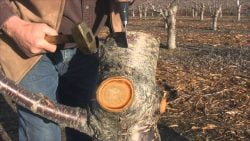
Gradually Chloë discovers more about her mysterious Grandpa, notably that he too was a victim of displacement, since his father was shot by Russians invading Poland in the Second World War, and his mother, who planned to take him to Canada, died when he was ten before she was able to make the move. Uli carries through with the plan, bringing an apple from the family garden and planting the seeds at an alcoholic Uncle’s farm in Edmonton. Later he retrieves branches from the tree and grafts them onto trees in his yard. Displacement and the resulting trauma emerge in the next generation since Uli’s wife dies young when Chloë’s Dad was a kid. Uli’s gambling habit got out of control when his wife got sick and he lost everything, including his home. Chloë’s Dad reveals the latter detail only after Uli has passed away. Telling the family stories allows him to begin grieving.
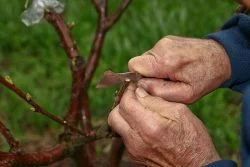
While displacement and loss form the emotional core of this novel, the therapeutic responses of collecting seeds, planting a garden and distributing the harvest to those who need it show the way forward. Uli began planting vegetables the year that his wife died and has collected seeds from people who have brought them from all over the world. Chloë discovers that he has recently been donating his produce to the local soup kitchen. After he dies, Chloë takes over his garden at some risk, since the landlord fences it off and hires security. She focusses on it as a way of coping with her parents’ splitting up. She and Nikko do guerrilla gardening, covertly taking veggie plants from Uli’s garden and planting them around the city. The last third of the novel comprises her quest to find Uli’s heritage seed collection, which has gone missing, so that she can pass on his legacy.
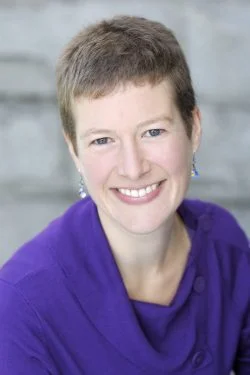
Gardens (and gardening) have long served as therapeutic responses to loss, from famous examples such as Stourhead in the U.K., to ordinary ones cultivated by grieving spouses in postage stamp backyards. Mulder handles this perceptive psychology subtly and mixes it in with contemporary issues that will appeal to increasingly aware and engaged middle-graders, such as eating healthy, food security, urban gardening, the importance of community, and (Uli’s) cherry tree grafting as a form of public art.
The title The Vegetable Museum creates a nice tension and may be intriguing to kids. Although there have been many children’s stories based on museums and their artifacts, from E. Nesbit’s The Story of the Amulet on down to the present, none that I know of expand the definition of a museum to an outdoor living garden with history embedded in it. Heritage seeds have escaped conflict and loss just as the characters in this novel have.
My only quibble would be that I wanted to know what was in the red box (and I think kids would want to know as well), even though it serves as something of a red herring, so to speak. Now you will have to read the story to find out what I mean.
In the bleak mid-winter, this intriguing novel of planting and regeneration holds special appeal. It made me look forward to planting those seeds in the soil once again (as well as to resolve to get the kids more involved, especially on the weeding end) — and to search out some heritage seeds this coming spring.
*
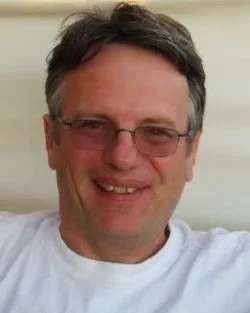
George M. Johnson is an award-winning writer and social justice advocate. In 2019 he was awarded the YMCA Peace Medal for his social justice work and writing over more than 25 years. His play Mockus, about a clown who provokes a desperate Mayor into trying playful approaches to his city’s environmental ills, will be produced by Jupiter Theatre in Calgary in March 2020. His screenplay Peace Pledge received Honorable Mention in the Euroscript Screenplay Competition and the New Renaissance Film Festival, (London). His most recent book is Mourning and Mysticism in First World War Literature: Grappling With Ghosts, now in paperback. His picture book Marisa and the Mountains will be published by Simply Read Books in February 2020, and another one, How Hope Became an Activist, later this year. Johnson is Professor of Screenwriting and Chairperson of English at Thompson Rivers University. More information can be found at https://georgemjohnson.com/. His wife is an avid Head gardener and he is a practical vegetable Under gardener.
*
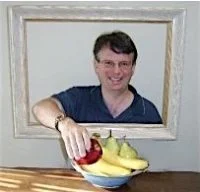
The Ormsby Review. More Books. More Reviews. More Often.
Publisher and Editor: Richard Mackie
The Ormsby Review is a journal service for serious coverage of B.C. books and authors, hosted by Simon Fraser University. The Advisory Board consists of Jean Barman, Robin Fisher, Cole Harris, Wade Davis, Hugh Johnston, Patricia Roy, David Stouck, and Graeme Wynn. Scholarly Patron: SFU Graduate Liberal Studies. Honorary Patron: Yosef Wosk. Provincial Government Patron since September 2018: Creative BC
“Only connect.” – E.M. Forster
